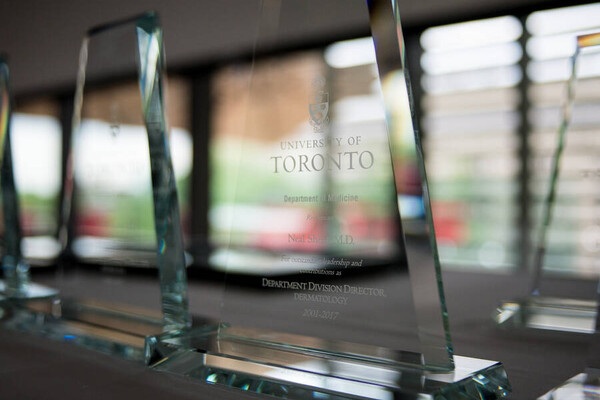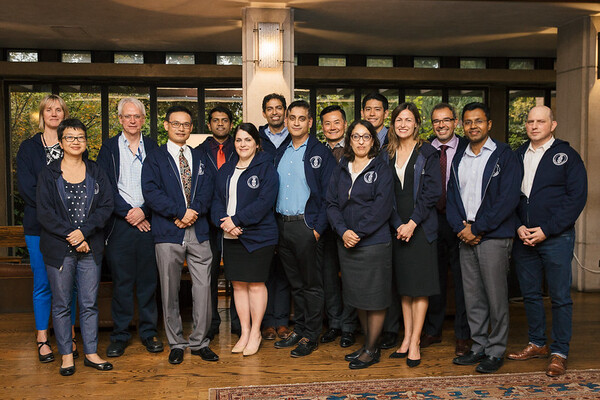Chair's Column: Advancing the Calibre of our Fellowships and the Experiences of our Fellows
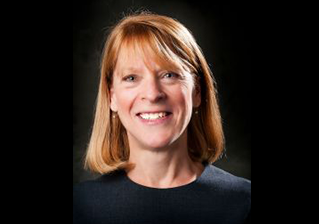
Dr. Gillian Hawker
Advancing the Calibre of our Fellowships and the Experiences of our Fellows
Did you know the Department of Medicine at the University of Toronto (U of T) is home to more than 300 fellowships, not including critical care (Figure 1)! It is perhaps not surprising given our global reputation for excellence in clinical care, education and research. Three-quarters of our fellows come from outside of Canada, which is fantastic! We want to be a destination for international fellows. We gain so much from their presence – we learn from their experiences and knowledge, and they from ours. Furthermore, our fellowships have served an important role for the department as a ‘pipeline’ for recruitment of future academics.
Figure 1
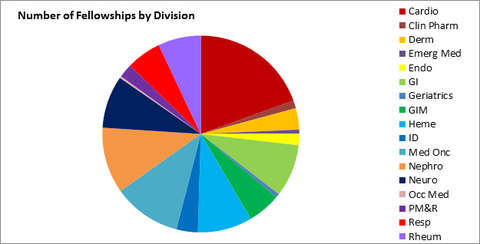
Fellowship Funding
There is an expectation that fellows are remunerated (funded), with few exceptions, at a rate at least equal to that of a PGY-1 trainee in our department irrespective of where they are from. Funding to support our fellowships comes from a number of sources, including fee-for-service income of our faculty members and unrestricted educational funds from various private, charitable and industry donors (see Figure 2). Only one-quarter of our fellowships are currently funded by another country or province – largely the Gulf States. As noted above, few are ‘self-funded’ by the fellows themselves. As financial pressures on healthcare increase, it is becoming more and more difficult to find funding for fellowships – ensuring those we have provide the highest possible educational experience will help us as we strive to find new sources of revenue to fund our training programs. In particular, I think we need to look for formal partnerships with organizations, including international universities, to expand our clinical research fellowship programs.
Figure 2
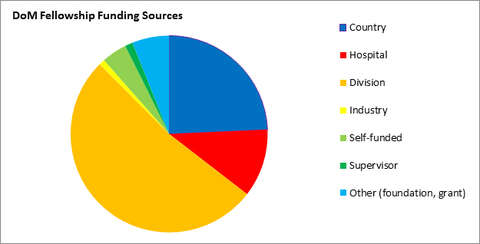
Demand for Fellowships in the DoM
We are extremely proud of our long history of providing outstanding post-residency fellowship training in medicine. As just one indication of the ongoing demand for our fellowships, out of the 273 unique webpages on the DoM website, the clinical and research fellowships and fellowships webpages rank third in terms of page views after the homepage and faculty directory. Between Sept. 7 and Nov. 9, the fellowship webpages received a whopping 3,674 pageviews (this is nearly 12 times more than the average for other webpages during this timeframe). Our analytics show us that the individuals visiting our fellowship pages are from Canada, the US, Mexico, Columbia, Brazil, the UK, Australia, India, Iran, Jordan, Saudi Arabia and Spain. Not bad for a few months!
We Cannot Rest on our Laurels
While this is all good, in at least three recent external divisional reviews, we heard from the reviewers that some of our fellows are unhappy. In brief, this is some of what we've heard:
- Some of our fellows feel they are not getting the (any) protected time for scholarship (e.g. research, course work, attending meetings, etc.) that they were promised, largely due to high clinical loads.
- Some have stated that they were unclear of the specifics of their fellowship program (expectations regarding how much clinical work, on-call responsibilities, time for academics, teaching requirements) and the specific objectives of the fellowship before arriving in Toronto.
- Many international fellows were offered no formal orientation to the Canadian healthcare system, let alone multiple diverse hospital environments.Rotations across multiple hospital sites further exacerbated the stress of the transition.
- Some felt that they were treated as residents. Unlike residents, fellows have completed their medical specialty training – they generally come to develop expertise in a particular clinical or academic area and therefore expect to have their fellowship training aligned with these goals.
There was often lack of clarity regarding funding/remuneration of the fellow - who does what, when, where and how? Clearly, we can do better! If we want to continue to be a top destination for the best and the brightest fellows, we need to ensure their experiences with us are both foundational and fun!
So, we’ve decided it’s time to take a closer look at our fellowships.
New Departmental Standards for Fellowships
To this end, Dr. Jeannette Goguen has led, alongside members of our department and university PGME leadership, the development of standards for DoM fellowships.
In brief, this document is intended to provide guidance to faculty and trainees regarding expectations for DoM fellowships with respect to the following:
- Description of the fellowship (educational objectives, duration/start and stop dates, amount of clinical work including on-call, academic and teaching expectations, supervisor, process of orientation of VISA trainees)
- The funding sources and amount/method of remuneration
- Process for fellowship approval (departmental division, DoM, PGME)
- Requirement for CPSO licensure (if ANY patient contact anticipated = clinical fellowship; if NO patient contact = research fellowship and licensure not required)
- Posting and interviewing prospective fellows (including proposed sites)
- The fellowship contract (template available on our website)
- Frequency and method of evaluation of the fellow and fellowship
Putting the Standards in Place
The department is now embarking on a thorough review of our existing fellowships and establishing the infrastructure to review and approve new fellowships to ensure they align with these principles and policies. To this end, our Vice-Chair, Education, Arno Kumagai, has posted a new DoM educational leadership role – Director, Fellowship Programs. INTERESTED CANDIDATES PLEASE APPLY!
We will also be ensuring that all divisions have a fellowship lead, as appropriate, who can vet new applications for fellowships and meet with and mentor fellows across their divisions so that we can proactively address how things are going and whether your educational objectives are being met.
If you are a current or past fellow with suggestions on making our fellowship experiences the absolute best, let me know what they are by emailing us, or sharing your experiences with me on Twitter @UofTDoMChair.
Thanks in advance for your patience and participation.

